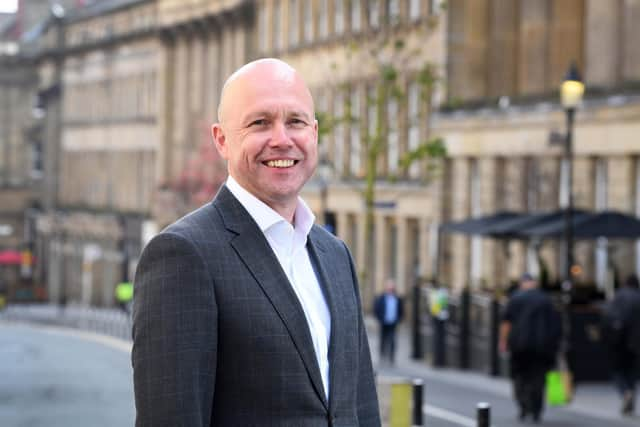How Steve Harris, regional director for Yorkshire at Lloyds Bank Commercial Banking, is guiding firms on the net zero path
THE prophets of doom appear to have underestimated Yorkshire’s business community.
Soaring inflation, supply chain disruption and the horrific suffering caused by the war in Ukraine have cast a cloud over Britain’s economic prospects.
Advertisement
Hide AdAdvertisement
Hide AdBut Steve Harris, regional director for Yorkshire at Lloyds Bank Commercial Banking, has hard evidence to support his belief that many firms in the region are still finding reasons to be cheerful. The Lloyds Bank Business Barometer, which questions 1,200 businesses monthly, provides early signals about UK economic trends.


“Many businesses in Yorkshire are really positive,” said Mr Harris, who has been based in the county for almost a quarter of a century. “When I speak to clients, there’s a good proportion that are looking at growth and investment. Our latest survey of sentiment in Yorkshire and The Humber showed that there was a real uptick in confidence. This is unusual because Yorkshire often lags a bit behind the national average.
“It’s now reached the highest level of confidence since the pandemic began. We are seeing businesses investing in growth which shows the ambition in the region.
“There are a few sectors which are still reeling from the wounds of the pandemic, and others are affected by headwinds such as inflation, rising energy costs and supply change shortages.”
Advertisement
Hide AdAdvertisement
Hide AdMr Harris is in regular contact with businesses on the economic coal face, who refuse to be cowed by forces beyond their control.
“We have supported the growth of household goods business Astonish in Bradford,” Mr Harris recalled. “The business invested in 120,000 sq ft of additional floor space and has created new jobs across a range of skill sets. Astonish is also a significant exporter, which we are helping to support.”
Government and consumers have deep-rooted concerns around the existential threat posed by climate change, according to Mr Harris. They want to see evidence businesses are alert to the danger.
He added: “Larger businesses have grasped this and have sustainable strategies in place which is driving significant change. As we get into the medium-sized corporate and SME market, there are challenges around capacity and resources.”
Advertisement
Hide AdAdvertisement
Hide AdLloyds has created a green buildings tool to help assess carbon emissions and it is also working on a carbon calculator tool to help businesses analyse their carbon footprint.
“Currently, we provide specific green, sustainability linked, and clean growth financing options to enable businesses to invest in lower energy activities or projects,” he said. “Fundamentally, this support helps businesses with the investment required to transition to a net zero environment.
“Lloyds Bank has made a commitment to provide £15bn of this financing by 2024 as well as making clear commitments to reduce the emissions we finance by 50% by 2030 and for it to be net zero by 2050.
“We recognise that it is imperative for us to support businesses with their plans to become sustainable,” he added. “The businesses who were early adopters of renewable energy will be seeing a significant pick-up in returns on their investments as they reduce carbon energy usage, especially given the current energy price increases being seen.”
Advertisement
Hide AdAdvertisement
Hide AdHe believes rising inflationary pressures are likely to continue to fuel investment to reduce energy use.
“For certain businesses in sectors where their processes require high-intensity energy usage, there may not currently be alternatives, or indeed, the costs of change will be prohibitive,” Mr Harris said.
“However, we are continually seeing technological developments in the reduction or reuse of energy. It is plain to see that, no matter what the challenge, businesses need to be aware of the need to transition and make a start on tackling the areas they can change, even if some aspects will take longer and be subject to future technological change.”
Mr Harris is working with Be the Business, a not-for-profit organisation, to help businesses develop leadership and management capabilities through mentoring schemes to support the growth of their enterprise.
Advertisement
Hide AdAdvertisement
Hide AdProductivity can be a challenge, but as businesses scale-up they become more productive and efficient.
“The Government, through UKEF (UK Export Finance), is standing squarely in support of exporters. We work closely with UKEF to provide the right trade products to support international trade.
“I’m an optimist. The resilience of the Yorkshire market is outstanding. Even during the pandemic, there were many businesses that adapted quickly and thrived.
The confidence levels among SMEs are higher than they were pre-pandemic, but I accept that the future is not without challenges given increasing inflation, interest rates and potential for supply disruption.”
Advertisement
Hide AdAdvertisement
Hide AdHe believes Yorkshire must stop hiding its light under a bushel.
“We don’t shout about our success enough,” he said. “I was driving into Leeds the other day, and it really struck me how the city had developed since I first arrived here in 1998.
“But it’s not just Leeds; other cities like Bradford and Sheffield have really moved forward too.
“It’s all about being demanding of policymakers and seeing what else can be done to support the growth agenda.”
Advertisement
Hide AdAdvertisement
Hide AdSteve Harris is the regional director and head of SME and Mid Corporate for the North East Region at Lloyds Bank.
He leads a team of more than 80 banking professionals, supporting businesses, which have turnover of £3m to £100m.
The team provides relationship managed services through a network of offices located in Nottingham, Sheffield, Leeds, Bradford, Hull, Middlesbrough and Newcastle.
Mr Harris has more than 25 years of commercial banking experience.
He has previously been a board member of the Leeds City Region LEP, a member of the Northern Powerhouse Investment fund advisory panel, and also chaired the Y&NE School for Social Enterprise.
